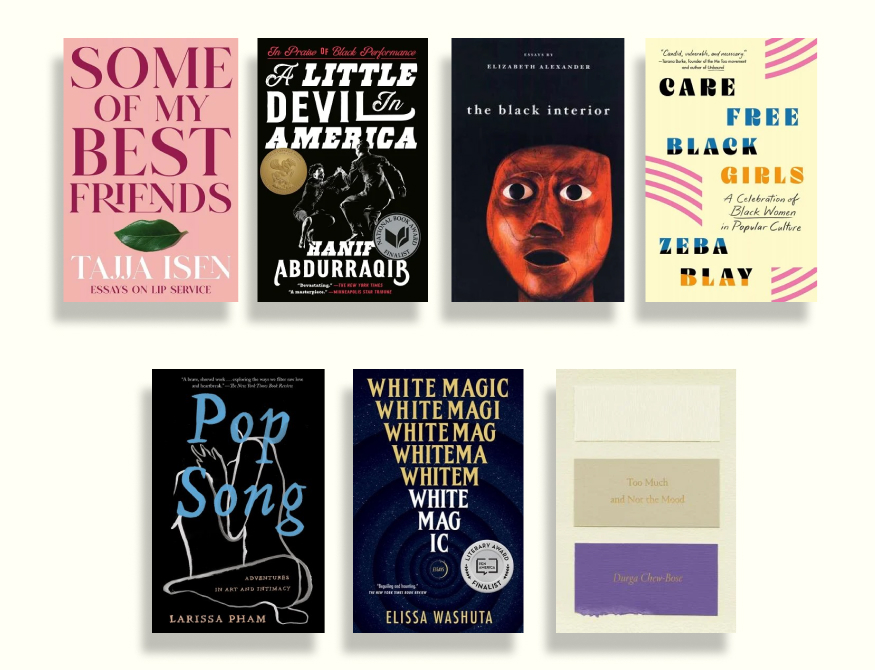- New Arrivals
Fiction
- Historical FictionCrime & ThrillersMysteryScience-FictionFantasyPoetryRomanceChildren’s BooksYoung Adult
- Biographies & MemoirsHistoryCurrent AffairsTech & ScienceBusinessSelf-DevelopmentTravelThe ArtsFood & WineReligion & SpiritualitySportsHumor
Children’s Books
Lists
Blog
Gift Cards
My Lists
Games
The co-op bookstore for avid readers
7 No-Skip Essay Collections You Can't Miss
The beauty of an essay collection is that you can read at your own pace, dipping in and out, forward and back to the parts that speak to you, whenever they speak to you. Not every essay has to be for every reader. Like music albums we all love, a few duds in an essay collection don't justify a hard pass. Still, those special cases when a collection has “no skips” are worth celebrating. Here are seven collections that accomplish such a feat.
White Magic by Elissa Washuta
Elissa Washuta is not here to pull punches. In White Magic, she haunts readers until they’re in too deep to escape her world of heartbreak and tumult. Readers follow through toxic relationships, bouts of alcoholism, and, following a bad break up, a journey to recover a connection to her heritage as a member of the Cowlitz Indian Tribe – her connection to which has until then only ever really materialized via sad, cheap knockoffs of Native spiritual practices. (Think plastic-wrapped tarot and witch kits.) The essays here are inventive and experimental – one tracks various dates and Twin Peaks episodes to chart synchronicities in her life. Other pieces explore big questions about colonialist attitudes and systems. I inhaled essay after essay, turning pages like a breeze turns waves to the shore, eager to see how she would blow my mind next.
Pop Song: Adventures in Art and Intimacy by Larissa Pham
Larissa Pham paints a lyrical and tender portrait of a young woman falling in and out of love with others – and herself – in this collection that will, like any good pop song, get stuck in your head. Her honesty and vulnerability leavens each page, making the book feel original and fresh, but also wildly affirming.
The Black Interior by Elizabeth Alexander
This book by award-winning poet Elizabeth Alexander has so much to offer readers when it comes to racial politics, visual art, and literary analysis. The way she writes about Black cultural figures like Denzel Washington and Langston Hughes, and the work they produced, will expand any reader's understanding of what art is capable of. The writing leans academic, but don’t panic; I found it accessible and invigorating. Lovers of poetry will especially appreciate the book because Alexander spends extra time engaging with the works of Gwendolyn Brooks and Michael S. Harper, to name a couple.
Too Much and Not the Mood by Durga Chew-Bose
This gorgeous essay collection that cuts across art and life will inspire you to find beauty in small moments. Anchored by its first and longest essay, “Heart Museum,” which opens with a “love hotel” emoji, Too Much and Not the Mood rips open a lush and observant interior world that will draw you in as the author examines how our hearts continue to beat despite life’s deep ebbs and sky-high flows.
A Little Devil in America: In Praise of Black Performance by Hanif Abdurraqib
In this part-memoir, part-cultural criticism of Black performance, author and culture scribe Hanif Abdurraqib writes about performers like Aretha Franklin and Don Cornelius with such love and care that your heart and mind as a reader will grow three sizes bigger after each essay. It’s impossible to skip a single piece. He moves through history and memories, braiding each with his unique brand of poetic observation and deep reverence for music, showing us how Black performers have almost single-handedly shaped American culture and its People.
Some of My Best Friends: Essays on Lip Service by Tajja Isen
What could child voice acting and the legal system’s objectivity (or claims of objectivity) have in common with personal essays and “anti-racist” books? According to book columnist and voice actress Tajja Isen, they’re all examples of how so-called good intentions can produce harmful actions. She connects these seemingly disparate subjects through blending personal narrative with sharp, insightful criticism and language that’s so concise and beautiful it will leave you unafraid of the work this moment calls for.
Carefree Black Girls: A Celebration of Black Women in Popular Culture by Zeba Blay
What does it mean to be carefree as a Black woman in a society steeped in colorism, fatphobia, and misogynoir? Culture writer Zeba Blay, who coined the hashtag that inspired a movement – #CarefreeBlackGirl – takes on this question in her debut, also named after her viral moment. This outstanding collection in many ways functions as a love letter to the many iconic Black women artists Blay admires. Come for the author’s deft analyses that never shrink from hard truths, and stay for page after page after page of writing that feels like getting sermonized at a Lizzo show. You'll learn from one of the best thinkers in the culture criticism game.

